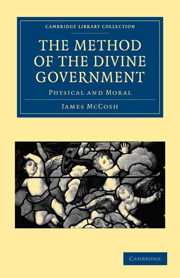Book contents
- Frontmatter
- Contents
- PREFACE TO FIRST EDITION
- PREFACE TO SECOND EDITION
- BOOK FIRST GENERAL VIEW OF THE DIVINE GOVERNMENT AS FITTED TO THROW LIGHT ON THE CHARACTER OF GOD
- BOOK SECOND PARTICULAR INQUIRY INTO THE METHOD OF THE DIVINE GOVERNMENT IN THE PHYSICAL WORLD
- BOOK THIRD PARTICULAR INQUIRY INTO THE PRINCIPLES OF THE HUMAN MIND THROUGH WHICH GOD GOVERNS MANKIND
- BOOK FOURTH RESULTS—THE RECONCILIATION OF GOD AND MAN
- APPENDIX ON FUNDAMENTAL PRINCIPLES
- REFERENCES TO AUTHORS AND SYSTEMS
APPENDIX ON FUNDAMENTAL PRINCIPLES
Published online by Cambridge University Press: 29 August 2010
- Frontmatter
- Contents
- PREFACE TO FIRST EDITION
- PREFACE TO SECOND EDITION
- BOOK FIRST GENERAL VIEW OF THE DIVINE GOVERNMENT AS FITTED TO THROW LIGHT ON THE CHARACTER OF GOD
- BOOK SECOND PARTICULAR INQUIRY INTO THE METHOD OF THE DIVINE GOVERNMENT IN THE PHYSICAL WORLD
- BOOK THIRD PARTICULAR INQUIRY INTO THE PRINCIPLES OF THE HUMAN MIND THROUGH WHICH GOD GOVERNS MANKIND
- BOOK FOURTH RESULTS—THE RECONCILIATION OF GOD AND MAN
- APPENDIX ON FUNDAMENTAL PRINCIPLES
- REFERENCES TO AUTHORS AND SYSTEMS
Summary
I.—LOGICAL NATURE OF THE THEISTIC ARGUMENT. (P. 7 Of TEXT.)
We believe that in every argument there is both a subjective and objective element. There is the one as well as the other of these alike in the a priori and the a posteriori argument in behalf of the existence of God. In the a priori argument of Clarke there is a fact assumed, the existence of space and time. In the a priori argument of Descartes, there is also a fact assumed, that the mind has an idea of the limited and imperfect, implying, it is argued (we think inconclusively), not merely the idea, but the existence of the infinite and the perfect. Again, in the a posteriori argument, there are certain intuitive mental principles proceeded on, such as the necessary connexion of cause and effect. “Un élément a posteriori,” says M. Cousin, “intervient comme condition de la démonstration a priori. De meme, si on y pense, la preuve par l'éxperience ou a posteriori implique un élément purement rationel ou a priori. En effet, à quelle condition concluez vous de la nature à Dieu? à cette condition que vous admettiez ou que du moins vous employiez le principe de causalité; car si vous êtes dépourvus de ce principe, vous contemplerez, vous étudierez eternellement le monde, vous adorerez éternellement l'ordre et la sagesse qui y regnent, sans vous élever jamais à cette supposition que tout cela doit avoir sa càuse.”
- Type
- Chapter
- Information
- The Method of the Divine GovernmentPhysical and Moral, pp. 517 - 532Publisher: Cambridge University PressPrint publication year: 2009First published in: 1850

